|
| |
Please don't
forget to refresh your browser each time you visit this or other pages that are
regularly updated
|
The kora, iconic Mande instrument, has well and truly crossed from its West
African home into the global music-place.This is well demonstrated by these
three new releases: the first putting the kora into an improvisational duo
contextwith one of the world’s greatest jazz drummers, the second into a
thoroughly contemporary jazz-rock-funk outfit,based in Marseilles, while the
third inhabits a multi-cultural jazz quartet. The common theme here is jazz,
and perhaps
the dancing, rippling sound of the kora does lend itself readily
to jazz, particularly because improvisational ability is a
key musicianship
requirement.
“Music from the Hearts of the Masters” – Jack de
Johnette/ Foday Musa Sosa (Golden Beams/ New Note)
The Jack de Johnette/ Foday
Musa Suso album is a rewarding listen. Foday Musa Suso is a
US based virtuoso
of the kora who has collaborated with Philip Glass, Herbie Hancock and Bill
Laswell. Jack de Johnette was once Miles Davis’ drummer of choice, and has
also played with
John Coltrane, Sonny Rollins and many other jazz luminaries.
The sensitivity of their interplay is striking and there is no sense of any
other instruments
being necessary. The kora provides rhythmic groove, melody
and solo virtuosity while the
drums provide such a broad range of rhythmic embellishment and colour that they
are almost melodic at times.
The music can be experienced as a high-quality tasteful background
atmospheric, but is better addressed as an
endlessly inventive and fascinating improvisational
dialogue Nigel Wood
|
|
|
Electric Griot Land - Ba Cissoko (Totolo/ All
Other)
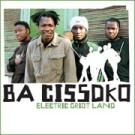 Ba Cissoko’s
follow-up to “Sabolan” is a heady mix of jazz, rock, funk and reggae,
underpinned by a strong rootsy feel throughout. The band features two kora
players,
Ba himself, and Sekou Kouyate who adds electronic and distortion effects to
his instrument.
The result is a thoroughly contemporary sound which places the traditional
sound of their
native Guinea into a modern context. Mainstream success, a la Amadou & Mariam, surely
beckons. The title of the
album, “Electric Griot Land”, gives a hint of one of their Western
influences,
and the intro to “Le reve de L’Oiseau” is a jazzy echo of the famous “Voodoo
Chile intro. Guests such as K’Naan, Tiken Jah Fakoly, and the Nubians, add
variety to the
vocal style, and some of the funky reggae tracks in particular are a delight – “rippling funk” is the term that springs
to mind as the kora adds its rhythm to the mix. A very satisfying album which manages to combine
roots with
modernism and does no disservice to either.
Nigel Wood Ba Cissoko’s
follow-up to “Sabolan” is a heady mix of jazz, rock, funk and reggae,
underpinned by a strong rootsy feel throughout. The band features two kora
players,
Ba himself, and Sekou Kouyate who adds electronic and distortion effects to
his instrument.
The result is a thoroughly contemporary sound which places the traditional
sound of their
native Guinea into a modern context. Mainstream success, a la Amadou & Mariam, surely
beckons. The title of the
album, “Electric Griot Land”, gives a hint of one of their Western
influences,
and the intro to “Le reve de L’Oiseau” is a jazzy echo of the famous “Voodoo
Chile intro. Guests such as K’Naan, Tiken Jah Fakoly, and the Nubians, add
variety to the
vocal style, and some of the funky reggae tracks in particular are a delight – “rippling funk” is the term that springs
to mind as the kora adds its rhythm to the mix. A very satisfying album which manages to combine
roots with
modernism and does no disservice to either.
Nigel Wood
|
|
|
Afro-Mandinka Soul (Tama-Silo)” – Seckou Keita
Quartet (ARC Music)
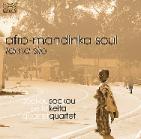 In some ways the third of these albums
featuring the kora sounds the most traditional,
albeit with a jazzier rhythmic feel to some of the songs. However the line-up
is far from
traditional, including as it does Egyptian violinist Samy Bishai, and Italian
double-bassist
Davide Mantovani. Moreover Seckou Keita, a UK-based native of
Senegal, uses some
non-traditional tunings on his kora and is open and
experimental in his approach, following
the example of his uncle, Solo
Cissoko, who has collaborated with Swedish folk musician,
Ellika Frisell.
Indeed Seckou has played with English and Scottish folkies and has expressed
an interest in playing with Irish musicians. Watch this space.
Seckou has a warm soulful
voice and his kora chimes and ripples across a gently funky bass-line on the opening “N’Fa”, lyrically a shot across
the bows
of older generations. The second track, “Tounga”, opens as a beautiful swaying
piece, featuring the
gorgeous vocals of Seckou’s half-sister, Binta Susso, and
the earthy sound of the riti (single-string fiddle) on the
jazzier mid-section. Elsewhere there are some nice contrasts between the
rippling, scurrying sound of the kora and
Samy Bishai’s long soulful strokes on the
violin. The songs are almost all composed by Seckou and the overall feel
of
the music is quite jazzy but well-rooted in West African folk tradition too.
An engrossing album which, again,
like the two albums above, is pushing
forward the frontiers of the kora repertoire.
Nigel Wood In some ways the third of these albums
featuring the kora sounds the most traditional,
albeit with a jazzier rhythmic feel to some of the songs. However the line-up
is far from
traditional, including as it does Egyptian violinist Samy Bishai, and Italian
double-bassist
Davide Mantovani. Moreover Seckou Keita, a UK-based native of
Senegal, uses some
non-traditional tunings on his kora and is open and
experimental in his approach, following
the example of his uncle, Solo
Cissoko, who has collaborated with Swedish folk musician,
Ellika Frisell.
Indeed Seckou has played with English and Scottish folkies and has expressed
an interest in playing with Irish musicians. Watch this space.
Seckou has a warm soulful
voice and his kora chimes and ripples across a gently funky bass-line on the opening “N’Fa”, lyrically a shot across
the bows
of older generations. The second track, “Tounga”, opens as a beautiful swaying
piece, featuring the
gorgeous vocals of Seckou’s half-sister, Binta Susso, and
the earthy sound of the riti (single-string fiddle) on the
jazzier mid-section. Elsewhere there are some nice contrasts between the
rippling, scurrying sound of the kora and
Samy Bishai’s long soulful strokes on the
violin. The songs are almost all composed by Seckou and the overall feel
of
the music is quite jazzy but well-rooted in West African folk tradition too.
An engrossing album which, again,
like the two albums above, is pushing
forward the frontiers of the kora repertoire.
Nigel Wood
|
|
Szaloki Agi - Hallgato Lament -
FECD020 (FolkEuropa)
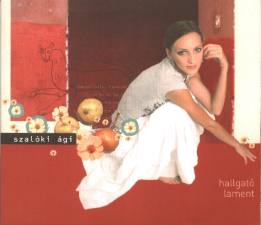 A
very fine collection of Hungarian ballads with traditional Hungarian
arrangements and some exquisitely sensitive jazz from her backing
musicians playing piano, guitar, double bass, percussion and sax.
Mostly comprising of sad songs, or laments as the title suggest, the
lyrics seem
to centre around the loss of her mother when she was young and lost
or unrequited love, the musicality of her voice easily carrying the
songs and transcending the language barrier. The
whole album, composed and arranged by Agi and her musicians, was
recorded in 2005 and only just available outside Hungary now. Hallgato
Lament is presented in a very nice digipack with English translations in the
accompanying booklet. If you enjoyed Souad Massi's new album you're sure
to get on with this one as well.
What the missus thought: Isn't that lovely!'
A
very fine collection of Hungarian ballads with traditional Hungarian
arrangements and some exquisitely sensitive jazz from her backing
musicians playing piano, guitar, double bass, percussion and sax.
Mostly comprising of sad songs, or laments as the title suggest, the
lyrics seem
to centre around the loss of her mother when she was young and lost
or unrequited love, the musicality of her voice easily carrying the
songs and transcending the language barrier. The
whole album, composed and arranged by Agi and her musicians, was
recorded in 2005 and only just available outside Hungary now. Hallgato
Lament is presented in a very nice digipack with English translations in the
accompanying booklet. If you enjoyed Souad Massi's new album you're sure
to get on with this one as well.
What the missus thought: Isn't that lovely!'
|
|
Papa Noel + Guests
Cafe Noir
(TUMI 141)
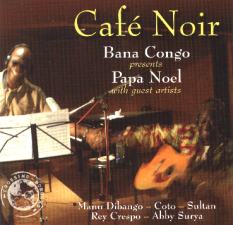 A
sumptuous collection of songs from one of the Congo's 'Old School'
guitaristsand member of Franco's
OK Jazz, Papa Noel. With a line-up that
includes Cameroonian Sax maestro Manu Dibango, Tres player Coto, Sultan,
Rey Crespo and Abby Surya, Cafe Noir is a lovely album of songs that
beautifully exposes The Congo's connection with Cuban music.
Papa Noel's
second album from his Bana Congo project features styles such as Congolese Rumba,
Afro-Cuban Son, classical African Rumba and even 'Merengue Soukous'.
With vocals and backing in both Spanish and Lingala and some fine brass
passages this album is a whole lot more vital than the previous and more
acoustic album simply titled Bana Congo. In my opinion I'm not sure the
cheesey keyboards that crept in occasionally on a couple of tracks are totally
necessary, however, on the whole, a very respectable
CD and a must for any fan of Congolese and/or Cuban music. (I
have since spoken to the director of Tumi music who assures me that
there are no keyboards on this
recording and that the keyboard sounds could be attributed to the
guitar pedals Papa
Noel was using)
Papa Noel will
be touring this project in 2007 and we hope to have him back in
Ireland next spring or summer
What Niwel Tsumbu
thought - 'Get me a copy!' A
sumptuous collection of songs from one of the Congo's 'Old School'
guitaristsand member of Franco's
OK Jazz, Papa Noel. With a line-up that
includes Cameroonian Sax maestro Manu Dibango, Tres player Coto, Sultan,
Rey Crespo and Abby Surya, Cafe Noir is a lovely album of songs that
beautifully exposes The Congo's connection with Cuban music.
Papa Noel's
second album from his Bana Congo project features styles such as Congolese Rumba,
Afro-Cuban Son, classical African Rumba and even 'Merengue Soukous'.
With vocals and backing in both Spanish and Lingala and some fine brass
passages this album is a whole lot more vital than the previous and more
acoustic album simply titled Bana Congo. In my opinion I'm not sure the
cheesey keyboards that crept in occasionally on a couple of tracks are totally
necessary, however, on the whole, a very respectable
CD and a must for any fan of Congolese and/or Cuban music. (I
have since spoken to the director of Tumi music who assures me that
there are no keyboards on this
recording and that the keyboard sounds could be attributed to the
guitar pedals Papa
Noel was using)
Papa Noel will
be touring this project in 2007 and we hope to have him back in
Ireland next spring or summer
What Niwel Tsumbu
thought - 'Get me a copy!'
|
|
El Tambura
- Between The Desert
and the Sea (World Village 450002)
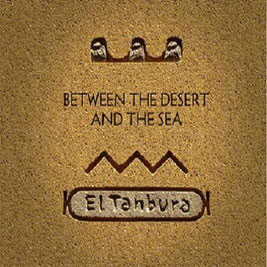 Sufi
fusion from Port Said in Egypt. El Tambura are described
as a collective of veteran master musicians, singers, fishermen, Philosophers
and custodians of the tradition of Simsimiyya music from the Mediterranean
coast of Egypt . The Simsimiyya is an ancient, strung harp-like instrument and
on this album accompanied by the Lyre, the Tanbura, the desert Flute and
traditional percussion. The music is very
hypnotic with call & response vocals and some fine traditional drumming and clapping
underpinning it. A refreshing change from the usual 'Qawwali' style of Sufi
(devotional) music from Northern India that we are probably more used to.
Light up your hookah, lay back and prepare to be transported.
What the missus
thought: 'That's lovely calming music, what is it?' Sufi
fusion from Port Said in Egypt. El Tambura are described
as a collective of veteran master musicians, singers, fishermen, Philosophers
and custodians of the tradition of Simsimiyya music from the Mediterranean
coast of Egypt . The Simsimiyya is an ancient, strung harp-like instrument and
on this album accompanied by the Lyre, the Tanbura, the desert Flute and
traditional percussion. The music is very
hypnotic with call & response vocals and some fine traditional drumming and clapping
underpinning it. A refreshing change from the usual 'Qawwali' style of Sufi
(devotional) music from Northern India that we are probably more used to.
Light up your hookah, lay back and prepare to be transported.
What the missus
thought: 'That's lovely calming music, what is it?'
|
|
Rise Up
- Thomas Mapfumo CDRW 136 (Real World)
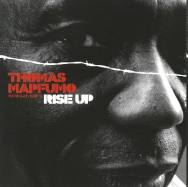 Previously
released in the US and Zimbabwe on a different label this album starts offwith
some gentle Sungura style Zimbabwean Reggae and soon settles into Mapfumo's
trade mark Chimurenga sound that he pioneered in the early 80s. Maybe not as
vital
as his earlier recordings, this album still grooves nicely along typical
Shona 'Mbira'
grooves with some nice female call & response backing vocals & and
jazzy/latino brass passages interweaving the mbira and guitar rhythms with
Mapfumo's voice as mellow
and reassuring as ever. Mapfumo still rails against the Zimbabwean government
for it's
corruption, and with songs like 'I'm Mad as Hell' and 'Diseases', pointing out
Zimbabwe's
chronic Aids epidemic aligned with the country's self imposed isolation from the rest of
the world, Mapfumo's continuing exile is ensured. Even in a democracy it is
important
for prominent people (especially musicians) to rise up and voice their protests
of government misrule, and as far as
Zimbabwe is concerned, Thomas Mapfumo is the main man. . An important CD with an even more important message.
Phil B Previously
released in the US and Zimbabwe on a different label this album starts offwith
some gentle Sungura style Zimbabwean Reggae and soon settles into Mapfumo's
trade mark Chimurenga sound that he pioneered in the early 80s. Maybe not as
vital
as his earlier recordings, this album still grooves nicely along typical
Shona 'Mbira'
grooves with some nice female call & response backing vocals & and
jazzy/latino brass passages interweaving the mbira and guitar rhythms with
Mapfumo's voice as mellow
and reassuring as ever. Mapfumo still rails against the Zimbabwean government
for it's
corruption, and with songs like 'I'm Mad as Hell' and 'Diseases', pointing out
Zimbabwe's
chronic Aids epidemic aligned with the country's self imposed isolation from the rest of
the world, Mapfumo's continuing exile is ensured. Even in a democracy it is
important
for prominent people (especially musicians) to rise up and voice their protests
of government misrule, and as far as
Zimbabwe is concerned, Thomas Mapfumo is the main man. . An important CD with an even more important message.
Phil B
|
|
|